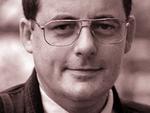|
|  |
Minister sneers "many roads lead to Ahaus"
Diet Simon - 24.04.2004 14:53
Many roads lead to Ahaus, and precisely that’s the problem of nuclear transport opponents, the environment minister of Saxony has sneered in the regional parliament in Dresden as it debated licensed waste trucking. “Problem? What problem?” commented an activist, “the more roads, the more action!”

MTR-2 Castor, different to those from power stations.

Steffen Flath

Simone Raatz

Uta Windisch
Steffen Flath of the conservative Christian Democrat CDU aimed the sarcasm at the Party of Democratic Socialism, one of the two opposition parties in the eastern state, ruled by the conservatives with a huge majority (56.9 % at the September 1999 election, the next is due 19 September this year).
The PDS, which succeeded the East German communist party, had called for the debate on trucking nuclear waste from Rossendorf near Dresden to Ahaus near the Dutch border.
But the PDS was all alone with its criticism. The Social Democrats in the Dresden house back the government in the dispute with North-Rhine Westphalia state, where their governing fellow Social Democrats and Greens oppose the transports.
"What can a sensible person have against us dissembling the research reactor in Rossendorf?" Flath asked hypocritically and totally off the issue.
He said things to the effect that he’d have preferred the Red Army taking not only the SS-20 missiles but also the 951 Soviet-made fuel rods with them when they left at the end of communist East Germany.
Flath said Saxony was spending 330 million euros to dispose of the Rossendorf installation and rejected accusations that tax revenues were being squandered.
He argued that there was no other way but to truck the 18 Castor caskets one at a time. He said only one casket fits on to a truck and needs to be secured with a special shock absorber that had been custom-made. It was “technically impossible and also a cost issue” to acquire 17 more such shock absorbers.
Flath contended that high policing costs would arise only if demonstrators not only protested but tried to stop the transports. (North-Rhine Westphalia says it would have to spend 50 million euros on policing.)
Flath accused the PDS of taking part in the organisation of the resistance against the transports and of trying to ensure that they wouldn’t be safe.
The PDS floor leader, André Hahn, told the house it was incomprehensible why the filled waste Castors couldn’t remain in Rossendorf for another 10 to 15 years. Transportation would needlessly endanger people and the environment and was politically and financially “absolutely irresponsible”.
It should be delayed until there was a decision on a final waste repository, Hahn said. Shifting the waste to Ahaus was pointless because the holding halls there and in Rossendorf were of identical construction.
The Social Democrats’ environment expert, Simone Raatz, while backing Flath, said she would have preferred railing, but the Federal Office for Radiation Protection (BfS) had confirmed that road transport was the safer and cheaper option. (The BfS site:  http://www.bfs.de/bfs?setlang=en) http://www.bfs.de/bfs?setlang=en)
And a woman MP of the CDU, Uta Windisch, saw a “huge advantage” in trucking: “No one can chain themselves to cobble stones.”
Flath had said earlier he can’t understand why NRW is challenging the transport permit and intends to litigate against it if it’s upheld.
“It’s been known for more than ten years that one day the Castors will be taken to Ahaus,” he said in a radio interview. There’d been a contract on this since 1995 under which Saxony had since then paid rent in Ahaus. He saw “no other possibility than finally taking them there now”.
On the danger issue he said in the interview: “Some risk remains in everything in life. But if the BfS issues a permit, everyone can take it as read that really everything has been checked out.”
A spokesman has reiterated the NRW government’s demand that there should be at most three transports of six Castors each, not 18 single ones along the 600-kilometre road route.
The spokesman of the Saxony interior ministry, Andreas Schumann, said no agreement was reached on this point at a meeting on Wednesday in Düsseldorf of officials from the federal states through which the route will run – Saxony, North-Rhine Westphalia, Thuringia, Lower Saxony and Hesse. (Map:  http://edition.cnn.com/TRAVEL/CITY.GUIDES/WORLD/Europe/germany/bigmap.html) http://edition.cnn.com/TRAVEL/CITY.GUIDES/WORLD/Europe/germany/bigmap.html)
“Problem? What problem?” was an activist’s comment at  http://de.indymedia.org//2004/04/80958.shtml on the “many roads” sneer, “the more roads, the more action!” To the cobble stones comment Bärbel Schön responded, “that’s what the CDU thinks....we’ll see.....we’ll see.” http://de.indymedia.org//2004/04/80958.shtml on the “many roads” sneer, “the more roads, the more action!” To the cobble stones comment Bärbel Schön responded, “that’s what the CDU thinks....we’ll see.....we’ll see.”
Flath expressed doubts in the interview that railing was safer. “We have no experience in Saxony, but I’ve been watching television in the past few years, too, and the thing I remember is that the biggest problems always occurred with the rail transports, simply because with them the route is known days before and then you get the well known pictures of people cementing themselves in or welding themselves to rail installations. Those problems don’t occur with road transports.” He said he didn’t expect protests each of the 18 times.
A transcript in German of the interview with Deutschlandfunk radio is at  http://www.dradio.de/dlf/sendungen/interview_dlf/258124/. Flath also speaks in it about http://www.dradio.de/dlf/sendungen/interview_dlf/258124/. Flath also speaks in it about
- why he thinks there have to be 18 truck runs,
- how the Castors are different to those from power stations,
- the policing costs,
- his anger at NRW allegedly inciting and taking part in protests,
- there being a number of research reactors in Germany whose waste needs to go to Ahaus,
- as far as he’s concerned transportation can start now,
- the route/s to be taken.
This posting is also sourced on
-  http://www.welt.de/data/2004/04/24/269045.html http://www.welt.de/data/2004/04/24/269045.html
-  http://www.freiepresse.de/TEXTE/NACHRICHTEN/SACHSEN/TEXTE/802336.html http://www.freiepresse.de/TEXTE/NACHRICHTEN/SACHSEN/TEXTE/802336.html
-  http://www.sz-online.de/nachrichten/artikel.asp?id=597382 http://www.sz-online.de/nachrichten/artikel.asp?id=597382
|
| Read more about: natuur, dier en mens | | supplements |  | |





